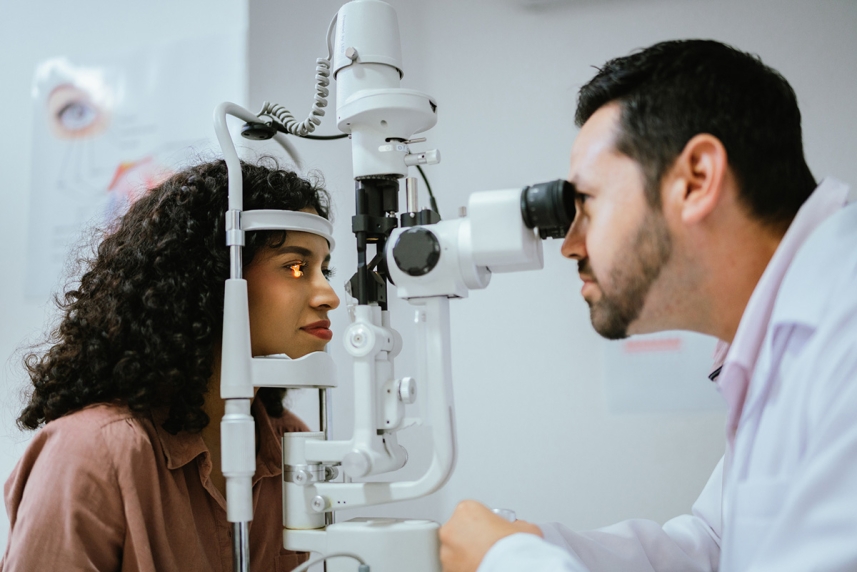How can a person’s eye care provider be covered?
A person might not know that certain vision care providers may be covered by medical insurance instead of vision insurance. Here’s why.

Let’s say a person is having blurry vision. They decide it’s a good idea to book an appointment with their eye care provider.
It might not be out of the ordinary for their eye care provider’s office assistant to ask them for their vision and health insurance cards.
Why? Because depending on the type of eye care provider, eye appointment or exam, either a person’s health insurance or vision insurance may cover the visit.
How might a person tell the difference? Find out.
Already have a primary care doctor who knows you inside and out? Add an eye care provider to your care team to take care of your eyes. Search the UnitedHealthcare Vision Network now.
What’s the difference between an optometrist and an ophthalmologist?
First, it can be important to understand the difference between these 2 types of eye care providers. Both optometrists and ophthalmologists may be part of a person’s care team.
But they may have different educations and skills. Here are some potential differences between the 2:1
- An optometrist typically completes 4 years of college-level education, followed by 4 years of optometry school, and earns a Doctor of Optometry (O.D.) degree. They primarily take care of a person’s eyes. That could include:
- Performing eye exams and basic vision tests
- Prescribing medications for certain eye diseases (in some states)
- Providing certain surgical procedures (in some states)
- Providing glasses and/or contact lens prescriptions
- An ophthalmologist goes to school for a lot longer than an optometrist — 12 to 14 years. They do that to become a medical doctor, earning a Doctor of Medicine (M.D.) or Doctor of Osteopathic Medicine (D.O.) degree.1 They get additional schooling and training so they can diagnose and treat eye diseases. They might also become surgeons. They may:1
- Diagnose and treat eye diseases
- Notice other health problems that may not be related to the eye
- Perform eye surgery
- Prescribe and fit glasses and/or contact lenses
If an optometrist were to diagnose moderate to severe forms of glaucoma and/or diabetic retinopathy in a patient, they may refer them to an ophthalmologist.2 (Glaucoma is an eye disease that affects the optic nerve. That’s a bundle of nerves that sends information from the retina to the brain.3 Diabetic retinopathy is an eye-related issue that’s caused by prolonged high blood sugar in someone who has diabetes.4)
How can a person’s insurance cover a visit to an optometrist or ophthalmologist?
Whether a person visits an optometrist or ophthalmologist for their annual comprehensive eye exam, that’s typically fully covered by vision insurance after paying an applicable copayment, or copay for short. That’s a fixed payment for vision-related services.
This eye exam can include a vision test to check for refractive errors like:5
- Nearsightedness (objects may appear blurry at a distance)
- Farsightedness (objects may appear blurry up close)
- Astigmatism (objects may appear blurry up close or far away)
That can help an optometrist or ophthalmologist decide whether an existing prescription needs to be updated. The exam may also help them determine if a person needs glasses or contact lenses to help correct their vision.
However, the following vision-related issues are typically covered by a patient’s health insurance, not vision insurance:
- Medical eye care. For example, if an eye care provider wants to monitor a freckle in a person’s eye, doing yearly tests, that would be considered medical eye care. (A freckle is a colored growth in the eye that may be similar to a mole on the skin. Many are harmless, but some may become cancerous.6)
- Disease management. If a person has diabetic retinopathy, an eye care provider’s treatment can fall under the patient’s health insurance. Other conditions that can be covered by health insurance instead of vision insurance may include:
- Age-related macular degeneration
- Cataracts, or cloudiness in the lens of the eye7
- Dry eye
- Glaucoma
- A stye, or painful red bump that forms on the edge of the eyelid8
- Surgery. If a person needs any kind of eye surgery — maybe for cataracts — it would also be covered by traditional health insurance.
What other benefits may vision insurance provide?
Vision insurance can come in handy for several other reasons. These could include:
1. Benefits for glasses and/or contact lenses. Many vision insurance plans may offer benefits to get glasses frames or contact lenses during a plan year.
It’s worth noting that a person will need a different prescription to get a new pair of glasses or a new supply of contact lenses. For example, they may need to see their eye care provider multiple times to get their contact lens prescription.9
2. Discounts on LASIK surgery. LASIK, which stands for laser-assisted in situ keratomileusis, is a surgical procedure that may correct vision issues like nearsightedness, farsightedness and astigmatism. A patient may even be able to stop wearing glasses or contact lenses after the surgery.10
People who have UnitedHealthcare Vision insurance can save 20% to 35% on LASIK surgery. They can also get a free exam.
3. Savings by using in-network providers. A person can save by using in-network eye care providers. These providers have agreed to lower rates with the insurance company. They can make it more affordable to see them. The opposite is also true: Seeing an out-of-network provider can be more expensive.
Why might a person need vision insurance?
Some people may not have vision insurance. This may be because:
- They’re self-employed and bought only health insurance.
- They didn’t get vision insurance through their employer.
- They may have bought a federal Health Insurance Marketplace plan that didn’t include a vision plan.
Whatever the case, it may be important to get vision insurance along with health insurance. (Vision insurance is a type of supplemental insurance. So a person will pay an additional amount on top of their health insurance to get it.)
Vision insurance can help cover routine eye exams and glasses and/or contact lenses. It could be important down the line too. If an eye care provider were to find an eye- or health-related issue during an exam, vision insurance may help a person save on future medical bills.
Already have vision insurance and in need of a new eye care provider? Search the UnitedHealthcare Vision Network now.
Sources:
- What Is an Ophthalmologist vs Optometrist? American Academy of Ophthalmology, February 2024.
- Ophthalmologist Cleveland Clinic, last reviewed August 2024.
- Glaucoma Mayo Clinic, November 2024.
- Diabetic Retinopathy National Eye Institute, last updated December 2024.
- Comprehensive Eye Exams American Optometric Association.
- Nevus (Eye Freckle) American Academy of Ophthalmology, November 2024.
- Cataracts Mayo Clinic, September 2023.
- Stye Cleveland Clinic, last reviewed December 2023.
- Types of Contact Lenses American Optometric Association.
- Glasses after LASIK? Optometrists Network.


